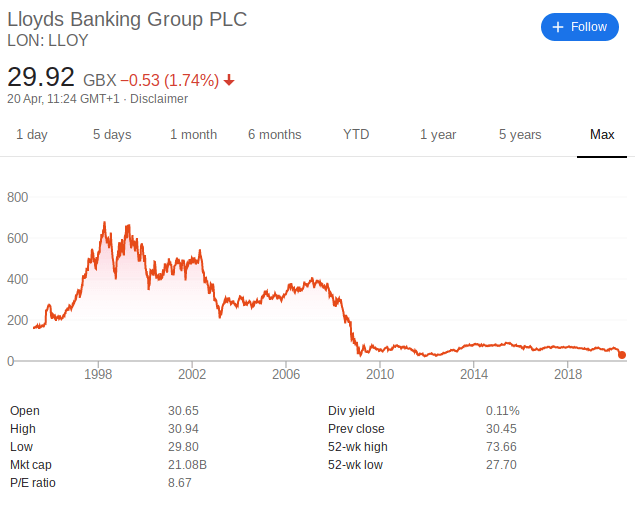How to Buy Lloyds Shares UK in 2022
Although the UK bank is worth just a fraction of its pre-2008 financial crisis highs, some would argue that you can now purchase its shares at a heavily discounted price.
In this article, not only do we give you a handy step-by-step guide on how you can buy Lloyds shares today, but we also discuss popular online brokers to do this with.
-
-
Where to Buy Lloyds Shares
As Lloyds is listed on the London Stock Exchange, you’ll need to use a stock trading site that gives you access to the UK markets. Although there are heaps to choose from in the online space, we have narrowed a list of popular stock brokers down to just one. This sites allow you to deposit and withdraw funds with a debit/credit card, fees and commissions are low, and most importantly holds licenses with the FCA, ASIC, and CySEC.
Plus500
Plus500 presents you with the right platform for buying and selling Lloyds stocks CFDs. Trading stock CFDs means that you don’t own the underlying share and, therefore, won’t be entitled to dividends. However, CFDs offer such perks as access to leveraged trades.
Investing in CFDs through Plus500 would also allow you to short-sell Lloyds stocks. This is where you are speculating on the value of the company going down. Plus500 offers commission-free trading on its stocks, so again, it’s just the spread that you pay. The UK-based platform holds multiple licenses, including the FCA, CySEC, MAS, and ASIC.
Its parent company is also listed on the London Stock Exchange and the online trading arm, Plus500 UK LTD is authorised and regulated by FCA. Registering a Plus500 trader account is also easy and straightforward as you only need minimum deposit of $100. It also supports a wide range of deposit and withdrawal options including debit/credit cards, Paypal, and bank transfer. There are no deposit or withdrawal fees; regardless of which payment method you opt for.
Our Rating
 80.5% of retail CFD accounts lose money. Sponsored ad
80.5% of retail CFD accounts lose money. Sponsored adHow to Buy Lloyds Shares
Looking to buy Lloyds shares right now, but not too sure where to start? Below you will find a step-by-step guide on how to make an investment through popular investment platforms. You can open an account, deposit funds, and buy shares in less than 10 minutes. If you want to use a different online broker, the steps below remain largely the same.
Step 1: Search for Lloyds (LLOY) Stock
Most trading platforms list over 800 shares on its platform, so you can enter ‘LLOY’ in the search box at the top of the page.
Step 2: Click on ‘Trade’
Next, click on the ‘Trade’ button.
Step 3: Set-Up Order and Buy Lloyds Shares
You will now see an order box, which needs to be filled in. If you’ve never placed a stock trading order online before, this can appear somewhat confusing.
As such, be sure to follow the guidelines outlined below.
- Amount: This is the amount of Lloyds shares that you wish to buy in dollars and cents. In this example, we are buying $100 worth of Lloyds stock, so we enter ‘100’ into the ‘amount’ box.
- Set Rate: Leave this set as a ‘market order’ if you wish to take the next available price. Alternatively, if you want to buy Lloyds shares at a specific price, change this to a ‘limit order’.
- Stop Loss: You may want to set up a stop-loss order when trading shares online, as this will allow you to mitigate your risks. Enter the price that you wish your trade to be closed at in the event the markets go against you.
- Take Profit: To avoid the need to sit at your computer and manually exit your trade, a take-profit can do this for you. Simply enter the price-target that you want the trade to be closed at.
Finally, click on ‘Buy’ to complete your Lloyds shares order.
Why People May Invest in Lloyds
Take note, you need to perform your own research prior to making an investment and never buy shares on the back of somebody else’s advice.
Shares are Heavily Discounted
The obvious starting point is the current price of Lloyds stocks in relation to its previous all-time highs. In fact, we need to go all of the way back to April 1998 for this, where its stocks were priced at 652p. Fast forward to Q2 2020 and the very same stocks are worth just 33p. This represents a decline of 95% -with the company now staring at a market capitalization of just £21 billion.
It’s highly unlikely that we will ever see highs like we did in 1998. However, a reasonable price target might the 63p that Lloyds was priced at in early 2020. Like the rest of the UK banking scene, the Coronavirus pandemic whipped a huge chunk off of Lloyds’ share price in a matter of weeks. If you’re happy to put a line through this, a return from 33p to 63p would present an increase of 90%.
An end to the PPI Saga
Lloyds was one the biggest perpetrators of the payment protection insurance (PPI) misselling saga, with the bank eventually forking out about £1.8 billion in refunds. Lloyds put the liability through its books in late 2019, which resulted in a Q3 drop in profits of 97%. On the flip side, the infamous PPI scandal is now behind the bank, at least in terms of financial liability. As such, Lloyds can once again focus its resources on profit.
Dividend-Paying Company
On top of targeting a pre-COV-19 price-point of 63p, an investment in Lloyds would also yield dividends, paid out every three months.
About Lloyds Shares
Company and Stock history
Lloyds Banking Group is a major UK high street institution was first launched in the 17th century. The company is listed on the London Stock Exchange, and it forms part of the FTSE 100 index. The bank is now significantly smaller than it once was, which is evident is the sheer-decline of its shares over the past two decades.
In fact, it was way back in 1998 when Lloyds last hit an all-time high stock price, when its shares were worth 652p. The banks’ decline was further amplified as a result of the 2008 financial crisis. In fact, the UK government was required to bail the bank out, resulting in a 43.4% purchase.

Since then, Lloyds stocks have been on a downward trajectory. At the time of writing in April 2020, you can purchase its stocks at just 33p – a mere fraction of its 1998 value. Although the vast majority of the UK banking scene has struggled since 2008, Lloyds recovery has been much slower in comparison to its industry rivals. For example, net income in Q3 2019 declined by a whopping 6%, amounting to a drop of £4.2 billion.
Conclusion
You will struggle to find an analyst that is bullish in the future direction of Lloyds. Whether it’s in terms of UK branches, net income, or operating profits, the bank is a mere shadow of its former self. This has translated into a rock-bottom share price that is now worth 95% less than it was in 2008. To put that figure into perspective, a £10,000 investment in Lloyds in 1998 would now be worth just £950.
On the flip side, there is arguably room for movement based on its current price of 33p, at least in the short-term when you consider the impact of COV-19. More specifically, if the bank is able to recover its pre-pandemic losses back to the 63p mark, this would represent a huge upswing. However, there is no guarantee that this will be the case, so be sure to perform your own research prior to parting with your money.
FAQ
What all-time high share price does Lloyds stocks have?
You would need to go way back to 1998, where Lloyds stock was worth 652p per share. Fast forward to April 2020 and these very same stocks are worth just 33p.
Does the UK government still own Lloyds?
The UK government purchased a 43.4% stake in Lloyds as a result of the 2008 financial crisis. The shares have since been sold by the government.
Does Lloyds pay dividends?
Yes, Lloyds does pay dividends, with payments distributed every three months.
Do I need to buy whole Lloyds shares?
No, both of the brokers on this page allow you to buy fractional stocks in Lloyds. This means you can invest as little as you like. With that said, Lloyds shares are only worth 33p, so this shouldn’t be an issue anyway.
What stock exchange are Lloyds stocks listed on?
Lloyds is listed on the London Stock Exchange, and it forms part of the FTSE 100.
Who owns Lloyds?
Lloyds is a public listed company (PLC), so it owned by its shareholders. As such, by purchasing just one share, you are effectively a part-owner in the bank.

Richard Davison
Richard Davison
Head of SEO and Content at LearnBonds, Richard oversees all aspects of Digital Marketing for the LearnBonds site. He has many years of experience working with Fintech and traditional financial sector companies.View all posts by Richard DavisonLatest News
Halifax Share Dealing Review
If you’re looking for a low-cost share dealing platform that makes it super easy to buy and sell stocks, ETFs, and funds, it might be worth considering Halifax. You don’t need to have a current account with the provider, and getting started takes just minutes. In this article, we review the ins and outs of...
UK Banks Approved Nearly 1 Million Mortgages in 2019, 7.4% More than a Year Ago
The United Kingdom’s high street banks approved close to a million mortgages in 2019. Data gathered by LearnBonds.com indicates that 982,286 mortgages were approved in 2019, an increase of 7.4% from 2018’s 909,597. The mortgage approval entails loans for home purchase, remortgaging and other loans. Compared to 2018, the number of mortgages approved for home...
WARNING: The content on this site should not be considered investment advice and we are not authorised to provide investment advice. Nothing on this website is an endorsement or recommendation of a particular trading strategy or investment decision. The information on this website is general in nature, so you must consider the information in light of your objectives, financial situation and needs. Investing is speculative. When investing your capital is at risk. This site is not intended for use in jurisdictions in which the trading or investments described are prohibited and should only be used by such persons and in such ways as are legally permitted. Your investment may not qualify for investor protection in your country or state of residence, so please conduct your own due diligence or obtain advice where necessary. Crypto promotions on this site do not comply with the UK Financial Promotions Regime and is not intended for UK consumers. This website is free for you to use but we may receive a commission from the companies we feature on this site.
Copyright © 2022 | Learnbonds.com



